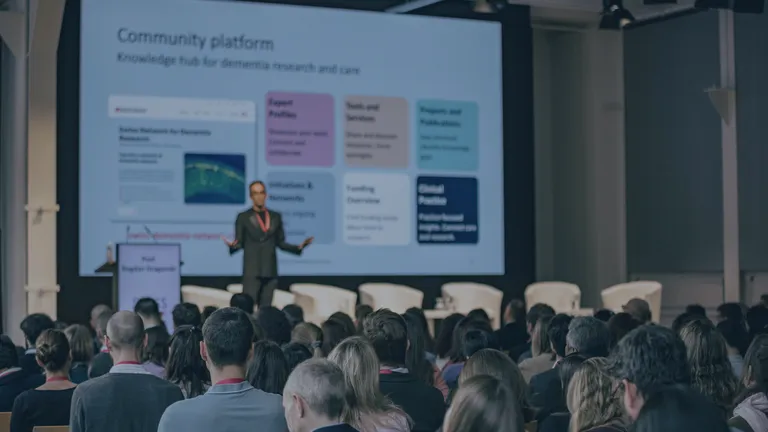Swiss Dementia Forum Highlights

A Diverse Community United: Participants, Expertise & Reach
Over 250 participants, 35 speakers on four stages, and nine exhibitors. The inaugural Swiss Dementia Forum 2025 demonstrated how closely basic research, clinical practice, and care are interconnected within Switzerland’s dementia research community.
As the name suggests, the Forum’s goal was to bring Switzerland together by uniting dementia experts, researchers, and professionals from all regions of the country. That we not only achieved this, but also attracted international participants, was particularly exciting. Proportionally, the French-speaking region was the strongest represented, followed by Zurich, Bern, Upper Valais, and the Basel region.
Equally impressive was the diversity of expertise and institutional backgrounds, with attendees coming from universities, hospitals, industry, and research institutes. About one-third of participants were engaged in basic research, while clinical researchers and professionals working in diagnosis, treatment, and care formed the next largest groups.
Posters, Discussions & Outstanding Talks
One of the main highlights of the Swiss Dementia Forum was hearing how much you enjoyed the interdisciplinary dialogue and even more, seeing that it truly works. Creating a program that appeals to everyone, from basic science researchers to clinicians and caregivers, was a challenge. Yet it was fantastic to see that even basic scientists were engaged in clinical topics. This is exactly what we aim for: fostering understanding across disciplines, building bridges, and ultimately promoting collaboration.
This interdisciplinary spirit was not only evident during the sessions but also at the poster presentations. We had 94 posters across seven categories, ranging from diagnosis and pathophysiological mechanisms to care and prevention. It was particularly encouraging to see the lively discussions, especially the engagement of early career researchers.
New Perspectives: Amyloid, Tau & the Future of Therapy
Another highlight was, of course, the outstanding quality of talks. From keynote lectures to parallel sessions and lightning talks, the scientific standard was excellent. A special keynote was delivered by Gil Rabinovici (University of California San Francisco), who shared his experiences implementing amyloid-targeting therapies in the U.S. With Switzerland awaiting approval for Lecanemab, his insights are highly valuable to learn from.
We were especially excited to welcome Prof. Marc Aurel Busche, who recently joined Switzerland as the new Professor for Dementia at the University of Basel’s Faculty of Medicine, based at Felix Platter Hospital. He presented fascinating insights into how amyloid-beta and tau disrupt circuit function across different brain regions, timescales, and cell types—pointing out that oligodendrocytes, not just neurons, are a major source of soluble amyloid-beta. His talk initiated lively discussion, and alongside him, many other leading experts in the field presented their work, making for an engaging and highly scientific program.
Research Meets Clinic: Spotlight on Swiss Memory Clinics
We were particularly pleased to have the represented in our program. Thanks to a strategic partnership signed earlier this year, we are working together to strengthen the connection between research and clinical practice in dementia. Their session, featuring Dr. Paolo Arosio (ETHZ) on the preclinical perspective and Dr. Ansgar Felbecker (Inselspital Bern) on the clinical use of blood-based biomarkers, followed by a discussion led by Prof. Julius Popp (University of Zurich), perfectly illustrated the value of this collaboration.
Celebrating Excellence: Award Winners 2025
Winning an award is always a highlight. With the support of Dementia Research Switzerland – , , and , we were able to present three awards: one for the best lightning talk and two for the best poster presentations. The scientific committee evaluated the performances during the event, and selecting the winners was no easy task given the high quality of all presentations.
- Dr. Robert Ellingford (University College London) won the lightning talk prize for his presentation on the synergistic effects of amyloid-beta and tau pathology in Alzheimer’s Disease, demonstrating how simultaneous suppression of both proteins can restore normal neuronal circuit function and improve cognitive outcomes.
- Marta Garo Pascual (Inselspital Bern) won the poster prize for her work on gender-specific associations between subjective cognitive complaints and episodic memory performance.
- Tom Willems (University of Bern) won the poster prize for his poster on the persistence of forgotten episodic memory engrams in the human brain.
An event like this would not be possible without our sponsors. One of the highlights was seeing how well our vision resonated with several companies and startups, who generously supported the conference.
Last but not least, dancing on the dance floor to the music of Skinny Jim Tennessee was an absolute highlight. It was wonderful to feel the positive energy and end the first day of the conference on such a high note.
Swiss Dementia Forum 2025
Valuable connections, exciting insights, and creative ideas shaped the very first Swiss Dementia Forum. We would like to extend our heartfelt thanks to everyone who made the event such an unforgettable experience – our participants, speakers, and exhibitors.
The only downside: the first Swiss Dementia Forum is already over. But there is more than just a silver lining: we can already look forward to the next edition in 2027.